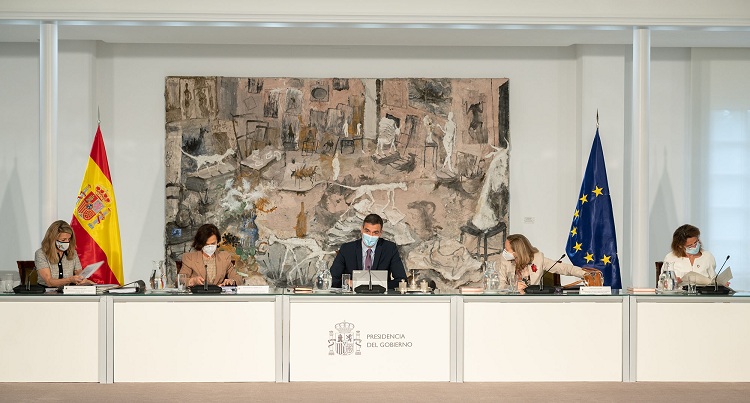Eduardo González
As of today, Spain will allow entry to citizens from non-EU countries who present a certificate with a complete vaccination schedule, regardless of whether or not they are on the European list of third countries to which entry restrictions have been lifted. This Spanish open-door policy will benefit not only the United States, but also the United Kingdom, which has once again been left off the European list.
Last May 24, the Order of the Ministry of the Interior came into force modifying the criteria for the application of a temporary restriction on non-essential travel from third countries to the EU and the Schengen area due to COVID-19. That Order, published in the BOE on May 21 and which followed the decision of the EU Council (of May 20) to update the Recommendation on the temporary restriction of non-essential travel to the European Union, allowed the incorporation of two new countries, the United Kingdom and Japan, to the Spanish list of third countries that then passed “the cut” (which also includes Australia, New Zealand, Rwanda, Singapore, South Korea, Israel, Thailand and China -in this case, subject to reciprocity).
This list coincides almost completely with that of the EU, although with an important nuance: the United Kingdom does not appear in the new list of third countries to which Brussels lifts restrictions for non-essential travel, which was published last Thursday and in which the only novelty is the incorporation of Japan. Instead, the Order of the Ministry of the Interior, as clearly stated in the BOE, had been activated precisely to allow “the inclusion of the United Kingdom and Japan among the countries exempt from restrictions”. The Commission’s spokesman, Eric Mamer, declared last Friday, in response to a specific question about Spain’s decision to open the doors to the United Kingdom, that the Member States must act with “coherence” on the basis of “the recommendations agreed by themselves in the Council”.
In any case, the Spanish government has chosen to resort to another procedure to implement its open-door policy outside the European list. Specifically, the European recommendation of May 20 lifted the non-essential travel restrictions for third country nationals who had received full doses in non-EU countries where vaccines approved by the European Medicines Agency, EMA (BioNTech/Pfizer, Moderna, AstraZeneca and Janssen) or emergency vaccines authorized by the World Health Organization, WHO (almost exactly the same EMA vaccines plus the Chinese Sinopharm and Sinovac) are used. With this criterion, the EU authorized the entry of individual citizens presenting a vaccination certificate even if their non-EU countries were not included in the list.
On the basis of this very lax criterion of individualization of cases (which only exempts countries presenting a special epidemiological risk or having dangerous variants of the virus, namely Brazil, India and South Africa), the President of the Government, Pedro Sánchez, announced on May 21, during his speech at an event at the International Tourism Trade Fair (FITUR) in Madrid, that as of June 7, citizens of all countries with which there is not full freedom of movement could enter Spain provided they have a certificate of having received the full course of a vaccine authorized by the EMA or the WHO.
For this purpose, travelers from third countries wishing to enter Spain for non-core reasons must fill out a declaration of responsibility with data on their vaccination, which must be attached to the Spain Travel Health (TSH) accreditation. The confirmation of the veracity of this declaration and of the TSH will correspond in the first instance to the airlines before the trip and, subsequently, to the Spanish health authorities by means of random checks on travelers entering the country. The vaccination certificate included in the TSH will serve by itself to exempt from other requirements, such as PCR or possible quarantines.
The United Kingdom’s “amber list”
Meanwhile, the new open-door phase in Spain and the non-inclusion of the UK on the latest European list coincide with London’s new twist on its international mobility policy. Last Thursday, the British authorities announced a new “green list” of countries and territories to which travel would be facilitated and in which not a single EU country appears, not even Portugal, which did appear on the list released three weeks earlier.
As then, Spain appears in the “amber” zone (following the colors of the traffic light) of this list, which can be revised every three weeks and which includes the countries as a block and, therefore, does not provide for any differentiated treatment by region. For this reason, and as on the previous occasion, the Minister of Industry, Trade and Tourism, Reyes Maroto, asked the United Kingdom last Friday to “pay attention” to the data of low incidence of infections in the Valencian Community, the Canary Islands and the Balearic Islands when it comes to facilitating the arrival of British tourists. The British authorities do not exactly prohibit travel to countries in the “amber” zone, but they do require travelers, before returning to the United Kingdom, to submit a PCR test in the country of origin, another PCR on arrival (each test of this type costs around one hundred euros) and a quarantine period that can only be shortened with a third PCR.







